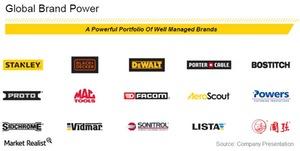How Stanley Works and Black & Decker Got Their Starts
Black & Decker was eventually merged with Stanley Works in 2010 to form the Stanley Black & Decker company (SWK).
April 1 2016, Published 1:07 p.m. ET

The origins of Stanley Works
Stanley Works was founded as Stanley Bolt Manufactory by Frederick Stanley in concert with his brother in 1843. The company officially came to be known as Stanley Works a decade later in 1852 after it received the charter of incorporation from the state of Connecticut. Stanley Works started out with a capitalization of $30,000 and had made annual revenues of $7,323 and $23,371 in 1853 and 1854.
Spirited in war
Driven by the railroads (XTN) and the defense (PPA) industries, the company achieved spectacular growth towards the end of the First World War with revenues growing from $480,000 in 1872 to $11 million in 1919. The company picked up several companies along the way and also rewarded shareholders through dividend returns. In 1877, Stanley Works began its current active streak of annual dividend payments.
A long rehab period after the Great Depression
The company’s performance after World War I and until the 1960s was sluggish as the construction (XHB) and manufacturing industries suffered heavy losses during the Great Depression. The company’s fortunes reversed after the 1960s, and by 1992, the company had made $2 billion in annual sales.
A brief history of Black & Decker
The Black & Decker Company was founded by Alonzo Decker and Duncan Black in 1910 in Baltimore, Maryland. The company started producing power tools in 1916, and through an aggressive sales strategy, acquisitions, and a widened product offering, became the leading power tool maker by the 1950s. In 1960, the company purchased Dewalt, a leading player in high-end power tools today.
The company underwent significant stagnation from the late 1990s to the early 2000s. The company was eventually merged with Stanley Works in 2010 to form the Stanley Black & Decker company (SWK). The sales of the combined company totaled $11.1 billion in 2015. Its major competitors in the North American region are Illinois Tool Works (ITW), Snap-on (SNA), and Tyco International (TYC).
